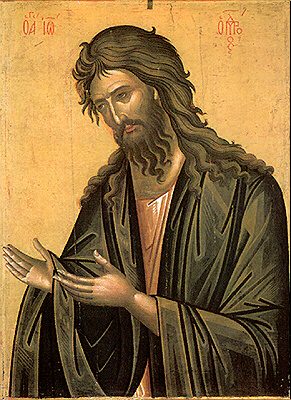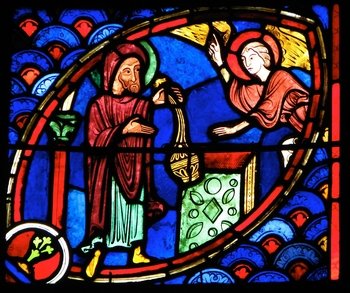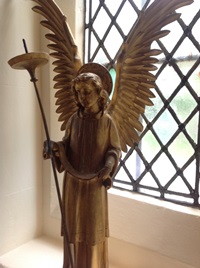
Sermon for the Second Sunday of Advent based on 2 Peter 3:8-15a and Mark 1:1-8
May I speak and may you hear through the Grace of our Lord; Father, Son and Holy Spirit. Amen
I hate waiting… I’m a completer / finisher and if something needs completing or finishing why wait around. Get on and do it straight away. Soonest done, soonest mended, soonest you can move on to the next thing. Yet haste is not always on the side accomplishing the best results. Yes, it creates a sense of achieving a lot in as little time as possible, but it’s also possible that things get missed, that plans change, that you have to go back and do it all again!
It’s taken me a long time to realise that time is not something to be got through as quickly as possible. Time is a precious commodity and the freedom of youth and endless days of pleasure give way to a sense of time passing too quickly towards its ultimate conclusion.
A recent spell of three hours in the waiting area of the Royal South Hants walk-in a few weeks ago, actually got me sitting and contemplating the nature of waiting. Situations such as this throw together a group of people each with different needs and attitudes, and I found myself noticing that the medical staff had perfected a list of priorities which was sensible and fair, however much everyone looked up each time hoping they were the next to be called through. The possible broken limbs, the youngest children, those who might be in immediate need of treatment to prevent further deterioration, and those who knew it wasn’t a matter of life and death but would really like some relief from their present condition.
The trouble with time is that it is a human concept, to be regulated and measured, and for those who believe a literal understanding of the beginning of time as described in the Genesis narrative it can seem that God ordained the hours, the days and the weeks to give us the rhythm of nature and seasons to measure our earthly existence.
It’s an interesting conundrum, and one which I recently spent discussing with some 8-year-olds at school the other day. I have to say that these are some of the best moments in my work as a school chaplain, when children divert me away from discussing how they might present a bible story in their Child-Led Collective Worship and morph into pondering the bigger questions in life. From annunciation to childbirth to creation in the space of two questions. From the miracle of Jesus’ conception to the lack of stories of his childhood to the question of how Adam and Eve’s son’s managed to find wives. Then back to the key question, but who created the creator and did he really do it all in six days.
Of course, the best way to answer these questions is to deflect it back to the questioner… What do you think? No, it’s not a get out clause, but it gives a chance for them to express what they might be thinking but not quite wanting to suggest in case it’s the worst answer ever and Reverend Linda will scoff at their ignorance and everyone else will laugh. To be honest you don’t get that sense of reticence with 8-year-olds, and they are actually very respectful and will listen to each other.
So, the response that God would have done it in God’s time and if he could create two people why could he not have gone on to create a few more. Nevertheless, it was the first statement that I heard so confidently expressed, and here this morning we hear the same point being made from the pen of St Peter, ‘do not ignore this one fact, beloved, that with the Lord one day is like a thousand years and thousand years are like one day.’
Peter is noting that the completion of God’s plan for his creation should not be something we are concerned about on a human timeline, but how we spend that waiting time, so that when and if it should happen in our lifetime, we could stand before God with a clear conscious that we had striven for all that is demanded of us as followers of Christ.
The fact is God’s plan has never been set to a particular timescale. He has been one of those draughtspeople who will take things back to the drawing board, recalculate and adjust depending on what is now wanted and needed.
If we look back over the Old Testament stories, we can clearly see God making these adjustments. He’d tried ripping up the original blueprint and starting again with Noah and his family, he’d given detailed plans to various architects of faith, including Abraham and Moses and he’d sent engineers into the field with instructions of what needed doing such as his prophets, Elijah and Isaiah, but it would seem that the people didn’t grasp the vision or understand what sort of kingdom he was trying to build.
It seemed that the workers had downed tools and were taking a long vacation, and God was silent… Except he wasn’t, he was busy pulling together the next part of his plan, and it would be the greatest draft yet because it needed to be absolutely right, and it needed to be a one off. He had tried giving chance after chance, now he was doing something new, something amazing.
So, what sort of publicity campaign would he run. How many global publishers would he engage to follow up the big launch? As always God surprises us. No big fanfare, well apart from a host of angels in the middle of the night. A teenage girl, a reluctant fiancé, in a land under foreign rule, a rag-tag bunch of shepherds and a foreign diplomatic visit. An aged couple in the temple and a wild-haired man in the desert, not exactly front-page news.
But he was here, and the next part of the plan was about to begin; ‘the beginning of the good news of Jesus Christ, the Son of God’. Today we focus on that beginning as John announces that the time has come, to repent and turn back to God, because time is running out.
He speaks with urgency and recognises that he is merely the preliminary act. The messenger sent ahead to prepare the way. And Jesus was coming out of his own time of preparation, not just a mere 40 days in the desert, but thirty odd years of learning, observing, listening, and waiting and it was now his time.
For John his understanding was likely to be that this was it, this would change everything, the Messiah had come, and things would never be the same again, and of course they weren’t. However, God’s plan was still not marching in time with that of his people and we can see that some two thousand earthly years later that his plan is still being worked out.
Nonetheless, it’s sometimes hard to see amongst this world of increasing secularism and human conflict the bigger and brighter plan for us. Someone asked a question the other day as to whether we were really living in the end times at the moment, and that maybe we’d all be better off if God did bring these times to an end. It’s hard to deflect such a question because of course there is no answer to that. God’s time is not our time, so we just have to wait.
But it’s in the waiting that we can make a difference. We can still share the Good News, we can represent Christ in what we do and say, we can show people that there is always hope. However dark a tunnel is, it is just that a tunnel, a means to get from one place to another, and as we move through it there will always be that glimmer of hope and light that appears at the opening.
We have to be patient, yet active. To wait, but to do so with hope. To mark time but to make the most of it. To let God be the completer / finisher in his own time.
This Advent we wait once again to share the Good News, God is with us. Amen










